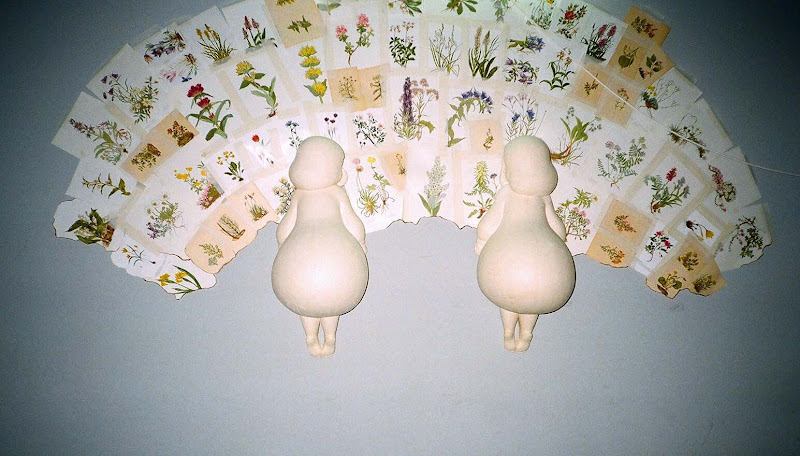Women who use makeup are literally self effacing, scrubbing off their real identity only to paint on a new appearance using mascara, black slightly smudged eyeliner, concealer, foundation, blusher, lipstick and blonde hair dye. Women at work literally constrict and limit themselves, deforming and reshaping their real bodies in cinched clothing, high heels and tight skirts.
So what? you say. The make-up's empowering. It's a way for women to assert their feminine identity at work, express themselves regardless of society's and men's desires, and paint themselves purple.
If only.The fact is, women change their appearance to be clones of the same blonde, busty woman with pink cheeks and thick black eyelashes. The way that all women strive for this particular Barbie look indicates the existence of a prototype of feminine beauty, heralded by the ironically misogynistic women's mags. A so-called 'enhancement' of women's appearance is a way for them to feel powerful at work, and a way for them to bridge the gender gap, some say. Yet the disparity between expectations of women's and men's appearance in a professional context indicates an aesthetic gap that still points to the pay gap - 12.8% - between men and women in full-time work. Women use make-up to make them feel confident and strong, rather than relying on inner confidence and strength, and in doing so they perpetuate the idea that a woman still needs to appeal to a male sexual appetite in order to succeed in the workplace.
Maybe makeup enables a woman to feel confident and strong at work- or maybe women's use of makeup is a denial of their identity, their make-up. Maybe the slap is a signal that, even at work, women are still just eye candy.
Sunday, January 4, 2009
The Red Academic
Property is theft anyway - at least, that's what I tell myself when stealing from my flatmates' shelves in the fridge...
"If property is theft then intellectual property is just stealing from the communal body of knowledge. My only hope is if ideas cannot be owned by anyone, if ideas exist purely as selfless facets of human wisdom rather than claimed & copyrighted snippets of someone's thoughts. Losing copyright over intellectual property would mean that no-one would strive for originality, to say something new, because they could not derive personal glory or fame for it - if good, it would be shamelessly repackaged and plagiarised. That way originality would no longer be the pinnacle of human achievement. This would leave people free to learn for learning's sake, not for fame, and search for what is 'right' or what seems truthful, rather than what is original. Too often people say something purely because it's new, exciting, unusual - with little regard for the truth of their statement.
Surely pointless to distract readers from the pursuit of human truths, in search of novelty?"
"If property is theft then intellectual property is just stealing from the communal body of knowledge. My only hope is if ideas cannot be owned by anyone, if ideas exist purely as selfless facets of human wisdom rather than claimed & copyrighted snippets of someone's thoughts. Losing copyright over intellectual property would mean that no-one would strive for originality, to say something new, because they could not derive personal glory or fame for it - if good, it would be shamelessly repackaged and plagiarised. That way originality would no longer be the pinnacle of human achievement. This would leave people free to learn for learning's sake, not for fame, and search for what is 'right' or what seems truthful, rather than what is original. Too often people say something purely because it's new, exciting, unusual - with little regard for the truth of their statement.
Surely pointless to distract readers from the pursuit of human truths, in search of novelty?"
Labels:
academia,
fridge,
original,
property is theft,
red academic
Subscribe to:
Posts (Atom)
